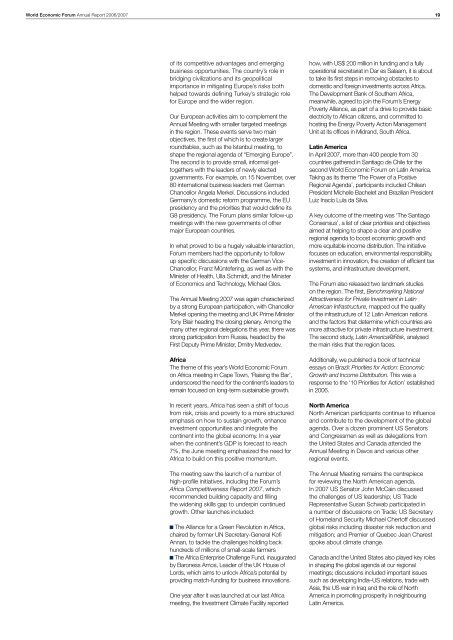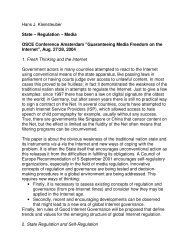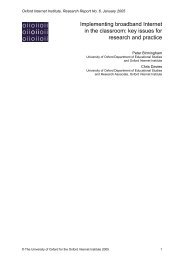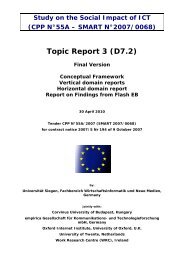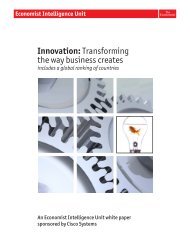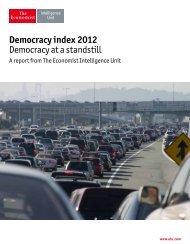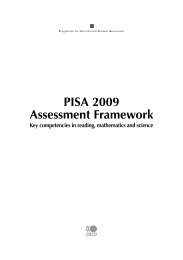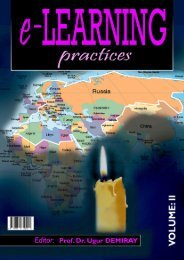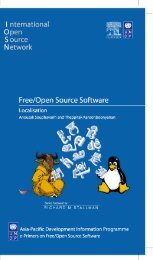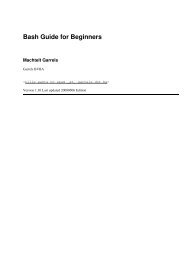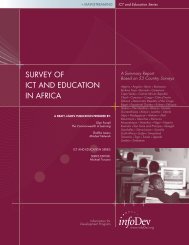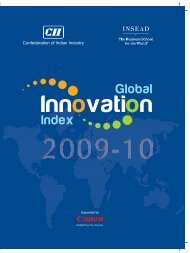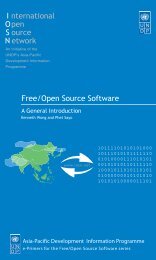World Economic Forum Annual Report 2006/2007
World Economic Forum Annual Report 2006/2007
World Economic Forum Annual Report 2006/2007
- No tags were found...
You also want an ePaper? Increase the reach of your titles
YUMPU automatically turns print PDFs into web optimized ePapers that Google loves.
<strong>World</strong> <strong>Economic</strong> <strong>Forum</strong> <strong>Annual</strong> <strong>Report</strong> <strong>2006</strong>/<strong>2007</strong> 19of its competitive advantages and emergingbusiness opportunities. The country’s role inbridging civilizations and its geopoliticalimportance in mitigating Europe’s risks bothhelped towards defining Turkey’s strategic rolefor Europe and the wider region.Our European activities aim to complement the<strong>Annual</strong> Meeting with smaller targeted meetingsin the region. These events serve two mainobjectives, the first of which is to create largerroundtables, such as the Istanbul meeting, toshape the regional agenda of “Emerging Europe”.The second is to provide small, informal gettogetherswith the leaders of newly electedgovernments. For example, on 15 November, over80 international business leaders met GermanChancellor Angela Merkel. Discussions includedGermany’s domestic reform programme, the EUpresidency and the priorities that would define itsG8 presidency. The <strong>Forum</strong> plans similar follow-upmeetings with the new governments of othermajor European countries.In what proved to be a hugely valuable interaction,<strong>Forum</strong> members had the opportunity to followup specific discussions with the German Vice-Chancellor, Franz Müntefering, as well as with theMinister of Health, Ulla Schmidt, and the Ministerof <strong>Economic</strong>s and Technology, Michael Glos.The <strong>Annual</strong> Meeting <strong>2007</strong> was again characterizedby a strong European participation, with ChancellorMerkel opening the meeting and UK Prime MinisterTony Blair heading the closing plenary. Among themany other regional delegations this year, there wasstrong participation from Russia, headed by theFirst Deputy Prime Minister, Dmitry Medvedev.AfricaThe theme of this year’s <strong>World</strong> <strong>Economic</strong> <strong>Forum</strong>on Africa meeting in Cape Town, ‘Raising the Bar’,underscored the need for the continent’s leaders toremain focused on long-term sustainable growth.In recent years, Africa has seen a shift of focusfrom risk, crisis and poverty to a more structuredemphasis on how to sustain growth, enhanceinvestment opportunities and integrate thecontinent into the global economy. In a yearwhen the continent’s GDP is forecast to reach7%, the June meeting emphasized the need forAfrica to build on this positive momentum.The meeting saw the launch of a number ofhigh-profile initiatives, including the <strong>Forum</strong>’sAfrica Competitiveness <strong>Report</strong> <strong>2007</strong>, whichrecommended building capacity and fillingthe widening skills gap to underpin continuedgrowth. Other launches included:The Alliance for a Green Revolution in Africa,chaired by former UN Secretary-General KofiAnnan, to tackle the challenges holding backhundreds of millions of small-scale farmersThe Africa Enterprise Challenge Fund, inauguratedby Baroness Amos, Leader of the UK House ofLords, which aims to unlock Africa’s potential byproviding match-funding for business innovations.One year after it was launched at our last Africameeting, the Investment Climate Facility reportedhow, with US$ 200 million in funding and a fullyoperational secretariat in Dar es Salaam, it is aboutto take its first steps in removing obstacles todomestic and foreign investments across Africa.The Development Bank of Southern Africa,meanwhile, agreed to join the <strong>Forum</strong>’s EnergyPoverty Alliance, as part of a drive to provide basicelectricity to African citizens, and committed tohosting the Energy Poverty Action ManagementUnit at its offices in Midrand, South Africa.Latin AmericaIn April <strong>2007</strong>, more than 400 people from 30countries gathered in Santiago de Chile for thesecond <strong>World</strong> <strong>Economic</strong> <strong>Forum</strong> on Latin America.Taking as its theme ‘The Power of a PositiveRegional Agenda’, participants included ChileanPresident Michelle Bachelet and Brazilian PresidentLuiz Inacio Lula da Silva.A key outcome of the meeting was ‘The SantiagoConsensus’, a list of clear priorities and objectivesaimed at helping to shape a clear and positiveregional agenda to boost economic growth andmore equitable income distribution. The initiativefocuses on education, environmental responsibility,investment in innovation, the creation of efficient taxsystems, and infrastructure development.The <strong>Forum</strong> also released two landmark studieson the region. The first, Benchmarking NationalAttractiveness for Private Investment in LatinAmerican Infrastructure, mapped out the qualityof the infrastructure of 12 Latin American nationsand the factors that determine which countries aremore attractive for private infrastructure investment.The second study, Latin America@Risk, analysedthe main risks that the region faces.Additionally, we published a book of technicalessays on Brazil: Priorities for Action: <strong>Economic</strong>Growth and Income Distribution. This was aresponse to the ‘10 Priorities for Action’ establishedin <strong>2006</strong>.North AmericaNorth American participants continue to influenceand contribute to the development of the globalagenda. Over a dozen prominent US Senatorsand Congressmen as well as delegations fromthe United States and Canada attended the<strong>Annual</strong> Meeting in Davos and various otherregional events.The <strong>Annual</strong> Meeting remains the centrepiecefor reviewing the North American agenda.In <strong>2007</strong> US Senator John McCain discussedthe challenges of US leadership; US TradeRepresentative Susan Schwab participated ina number of discussions on Trade; US Secretaryof Homeland Security Michael Chertoff discussedglobal risks including disaster risk reduction andmitigation; and Premier of Quebec Jean Charestspoke about climate change.Canada and the United States also played key rolesin shaping the global agenda at our regionalmeetings; discussions included important issuessuch as developing India–US relations, trade withAsia, the US war in Iraq and the role of NorthAmerica in promoting prosperity in neighbouringLatin America.


